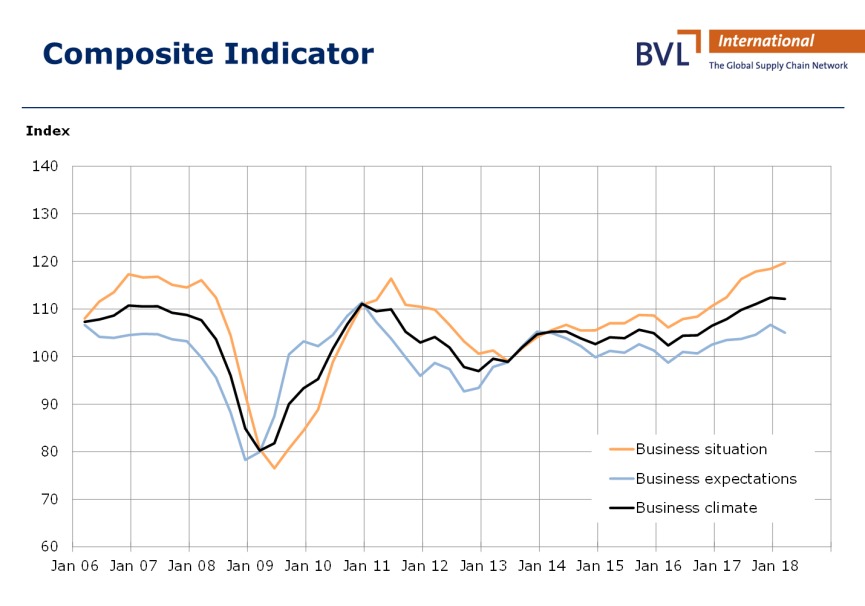Mostly sunny with scattered clouds - Logistics Indicator 1st Quarter 2018
Commentary by Prof. Dr. Robert Blackburn, Chairman of the Board, BVL International
The climate in the German logistics industry is excellent – as underlined by the findings of the ifo Insitute for the BVL Logistics Indicator in the first quarter of 2018.
The ifo Institute arrives at this assessment despite the risk of a trade war between some of the world's major economic powers. The Handelsblatt Research Institute describes the "onset of protectionism as the biggest threat to the German economy" and underlines the importance of international value added chains, emphasising that the global division of labour and free cross-border trade are the key to prosperity and peace.
The ifo experts are still optimistic about GDP, forecasting growth of 2.6 percent for the current year and 2.1 percent for 2019. The predicted growth figures for the Eurozone are 2.3 percent in 2018 and 1.9 percent in 2019, while global GDP is expected to increase by 3.4 percent this year and 3.1 percent next year.
This upturn is driven by the supply chain managers and logistics managers, and the positive sentiment in the sector therefore comes as no surprise. Assessments of the current business situation are at their highest since the Logistics Indicator survey was launched twelve years ago. This trend is underpinned by the extremely positive indicator scores in industry and trade.
But there are nevertheless a few small clouds on the horizon. Business expectations for the coming months are down slightly on the previous quarter – among both the users of logistics services in industry and trade as well as the logistics service providers. Personnel recruitment plans are still in the pipeline but are not at the same high level as in previous quarters. The recruitment boom is levelling out, with the ratio of job-seekers to vacant positions at its lowest in 25 years.
The skill shortage is now being felt in most sectors and is having a constraining effect. The most important levers, as regularly emphasised by BVL, are "education" and "the courage to embrace change", in particular with regard to the digital transformation of business processes. Other key success factors for today's companies include image and brand promotion. Companies who want to win over qualified personnel in a fiercely competitive labour market have to be "attractive". According to a survey conducted among 400 logistics service providers by the Get-the-Point agency, only just under one in two respondents see themselves as attractive employers. BVL supports companies who want to develop logistics careers and improve the image of the jobs in the sector. An expert focus group has been set up specifically for this purpose and offers free guidelines, photo and video materials, and information on successful image and brand promotion. In addition, Supply Chain Day provides companies with an opportunity to showcase themselves as potential employers. This day of action was called into being by BVL in 2008 and takes place every year in April – and Supply Chain Day 2018 is this week, on April 19, when well over 350 companies will be opening their doors and letting interested members of the public take a look behind the scenes of their operations.
If it is to create value added reliably and effectively, German industry needs an adequate infrastructure – for all modes of transport as well as on the digital front. BVL has long been warning the policymakers about the risk of living off the fruits of the past. Germany must step up its investment in both the physical and the digital infrastructure. Because of the time lost due to capacity bottlenecks in ports, on railway lines and motorways or as a result of dead spots in the mobile phone network, we are simply unable to exploit potential for increased productivity that would otherwise be easy to achieve. The political decision-makers must create the necessary framework conditions for continued economic growth and competitiveness. German companies need planning predictability.

Downloads
- Complete results ( PDF, 123 Kb)
- Commentary by ifo Institute, Prof. Wollmershäuser ( PDF, 61 Kb)
- Commentary by BVL's Prof. Dr. Robert Blackburn ( PDF, 42 Kb)

